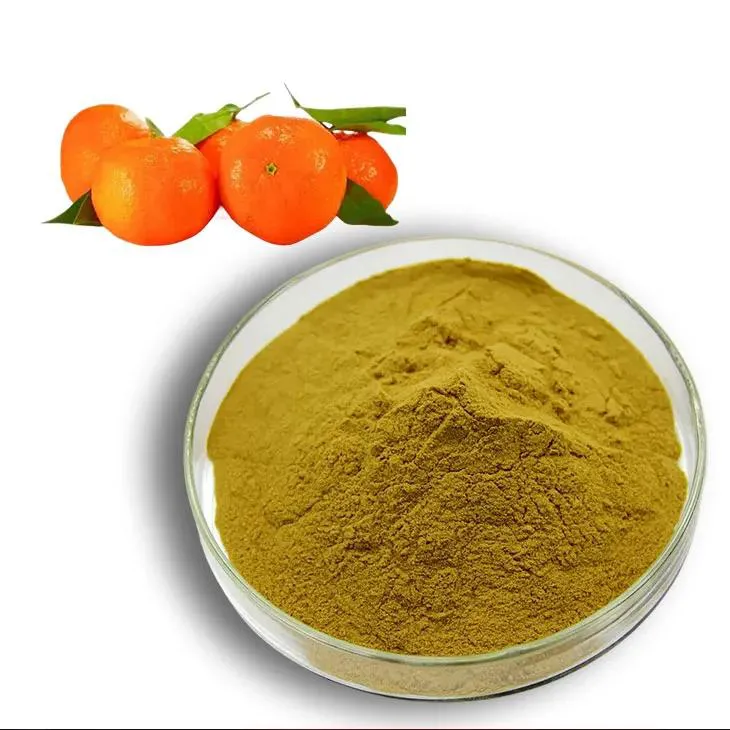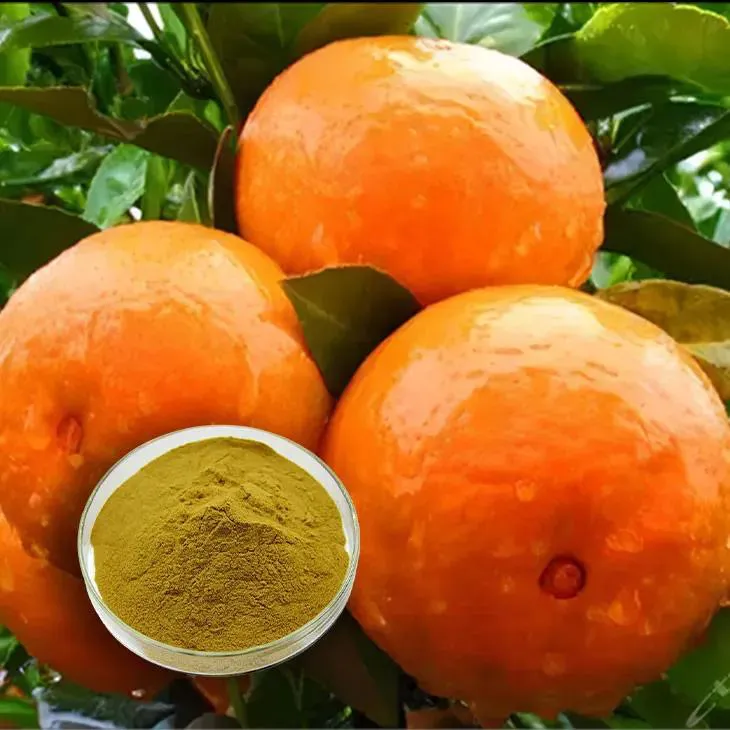- 0086-571-85302990
- sales@greenskybio.com
All about Citrus Bioflavonoids.
2024-12-14

1. Introduction to Citrus Bioflavonoids
Citrus bioflavonoids are a diverse group of compounds that are of great significance. These natural substances are found in large quantities in citrus fruits such as oranges, lemons, and grapefruits. They are not just simple components but rather play a multi - faceted role in various aspects of human health and other areas.

2. Antioxidant Properties
Antioxidant capabilities are one of the most prominent features of citrus bioflavonoids. In the human body, free radicals are constantly generated through normal metabolic processes as well as exposure to environmental factors such as pollution and radiation. These free radicals can cause oxidative stress, which is linked to a variety of diseases and premature aging.
Citrus bioflavonoids act as powerful antioxidants by donating electrons to free radicals, thereby neutralizing them. This process helps to protect cells from damage caused by oxidative stress. For example, flavanones, a type of citrus bioflavonoid, have been shown to be effective in scavenging free radicals in vitro studies. This antioxidant activity is not only beneficial for overall health but also has implications for the prevention of chronic diseases such as cancer, neurodegenerative diseases, and cardiovascular diseases.

3. Role in Cardiovascular Health
Citrus bioflavonoids have a positive impact on cardiovascular health. One of the ways they contribute is through their potential effect on cholesterol levels. Some studies suggest that certain bioflavonoids can help in reducing LDL (low - density lipoprotein) cholesterol, which is often referred to as "bad" cholesterol. High levels of LDL cholesterol are associated with an increased risk of atherosclerosis, a condition where plaque builds up in the arteries.
Additionally, citrus bioflavonoids may also play a role in regulating blood pressure. They can help to relax blood vessels, which in turn can lead to a reduction in blood pressure. For instance, Hesperidin, a bioflavonoid found in oranges, has been shown to have vasodilatory effects. This means that it can widen the blood vessels, allowing for better blood flow and reducing the workload on the heart. By improving cholesterol levels and blood pressure, citrus bioflavonoids can contribute to a healthier cardiovascular system.

4. Enhancement of Vitamin C Absorption
Another important role of citrus bioflavonoids is in enhancing the absorption of vitamin C. Vitamin C is a well - known antioxidant and is essential for various functions in the body, including collagen synthesis, immune function, and wound healing. However, the body's ability to absorb vitamin C can be limited.
Citrus bioflavonoids work in synergy with vitamin C. They can help to protect vitamin C from oxidation in the gut, allowing for more efficient absorption. This is because bioflavonoids themselves are antioxidants and can prevent the breakdown of vitamin C. For example, in a diet rich in citrus fruits, the combination of bioflavonoids and vitamin C can provide greater antioxidant benefits compared to consuming vitamin C alone.
5. Applications in Skincare
Citrus bioflavonoids have found applications in the field of skincare. Their antioxidant and anti - inflammatory properties make them valuable ingredients in skincare products.
In terms of antioxidant effects, they can protect the skin from damage caused by free radicals in the environment, such as UV radiation and pollution. This helps to prevent premature aging of the skin, including the formation of wrinkles and age spots. For example, bioflavonoids can neutralize free radicals that are generated when the skin is exposed to sunlight, reducing the oxidative damage to skin cells.
The anti - inflammatory properties of citrus bioflavonoids can also be beneficial for the skin. Inflammatory skin conditions such as acne, eczema, and psoriasis can be alleviated to some extent by using products containing bioflavonoids. They can help to reduce redness, swelling, and irritation in the skin, promoting a healthier complexion.
6. Different Types of Citrus Bioflavonoids
There are several different types of citrus bioflavonoids, each with its own unique properties.
6.1 Flavanones
Flavanones are the most abundant type of bioflavonoids in citrus fruits. They include compounds such as Hesperidin and naringin. Hesperidin is found mainly in oranges and has been studied for its potential health benefits, such as its role in cardiovascular health and antioxidant activity. Naringin, which is present in grapefruit, has also shown antioxidant and anti - inflammatory properties.
6.2 Flavones
Flavones are another type of citrus bioflavonoids. They are less common in citrus fruits compared to flavanones but still play important roles. Some flavones have been shown to have anti - cancer properties in laboratory studies. They may also contribute to the overall antioxidant capacity of citrus fruits.
6.3 Flavonols
Flavonols are found in citrus fruits in smaller amounts. However, they are also important for their antioxidant and potential health - promoting effects. For example, Quercetin, a type of flavonol, has been studied for its anti - inflammatory and anti - allergenic properties.
7. Dietary Sources and Intake
Citrus fruits are the primary dietary sources of citrus bioflavonoids. Oranges, lemons, grapefruits, and tangerines are all rich in these compounds. For example, an orange contains a significant amount of hesperidin, while grapefruit is a good source of naringin.
In terms of recommended intake, there is no specific daily requirement for citrus bioflavonoids as of yet. However, consuming a diet rich in citrus fruits can ensure an adequate intake of these beneficial compounds. This can be achieved by including fresh citrus fruits in the diet on a daily basis, either as a snack or as part of a meal. Additionally, citrus juices can also be a source of bioflavonoids, although they may contain added sugars, so it is advisable to choose natural, unsweetened juices.
8. Research and Future Perspectives
Research on citrus bioflavonoids is still ongoing, and there are many areas that hold potential for future exploration. Scientists are continuously investigating the exact mechanisms by which these bioflavonoids exert their health - promoting effects. For example, more in - depth studies are needed to fully understand how they interact with cells at the molecular level to reduce the risk of diseases.
In the field of medicine, there is potential for the development of new drugs or dietary supplements based on citrus bioflavonoids. If their beneficial effects on cardiovascular health, for example, can be further harnessed, it could lead to new treatment options for patients with heart - related conditions.
In skincare, further research could lead to the development of more effective products. By understanding how citrus bioflavonoids interact with different skin types and skin conditions, it may be possible to create customized skincare formulations that target specific skin concerns more effectively.
FAQ:
What are citrus bioflavonoids?
Citrus bioflavonoids are a group of compounds that are found in large amounts in citrus fruits such as oranges, lemons, and grapefruits. They have multiple important functions in the body.
What are the antioxidant properties of citrus bioflavonoids?
Citrus bioflavonoids are known for their antioxidant capabilities. They can fight against free radicals in the body, which helps to reduce oxidative stress. By doing so, they may play a role in preventing various diseases.
How do citrus bioflavonoids contribute to cardiovascular health?
Citrus bioflavonoids may contribute to improved cardiovascular health. They might help in reducing cholesterol levels and blood pressure, which are important factors for a healthy heart.
What is the relationship between citrus bioflavonoids and vitamin C?
Citrus bioflavonoids can enhance the absorption of vitamin C. Vitamin C is another important nutrient in citrus fruits, and the bioflavonoids help the body to better utilize it.
Why are citrus bioflavonoids used in skincare products?
Citrus bioflavonoids are used in some skincare products because of their potential anti - inflammatory and antioxidant effects. These effects can help to maintain healthy skin and fight against signs of aging.
Related literature
- The Role of Citrus Bioflavonoids in Health and Disease"
- "Citrus Bioflavonoids: Properties, Sources and Applications"
- "Bioflavonoids from Citrus Fruits: A Review of Their Antioxidant and Health - Promoting Effects"
- ▶ Hesperidin
- ▶ citrus bioflavonoids
- ▶ plant extract
- ▶ lycopene
- ▶ Diosmin
- ▶ Grape seed extract
- ▶ Sea buckthorn Juice Powder
- ▶ Beetroot powder
- ▶ Hops Extract
- ▶ Artichoke Extract
- ▶ Reishi mushroom extract
- ▶ Astaxanthin
- ▶ Green Tea Extract
- ▶ Curcumin Extract
- ▶ Horse Chestnut Extract
- ▶ Other Problems
- ▶ Boswellia Serrata Extract
- ▶ Resveratrol Extract
- ▶ Marigold Extract
- ▶ Grape Leaf Extract
- ▶ blog3
- ▶ blog4
- ▶ blog5
-
Pure 85% Tomentil Extract.
2024-12-14
-
Troxerutin
2024-12-14
-
Acai Berry Extract
2024-12-14
-
Lemon Balm Extract
2024-12-14
-
Hawthorn Extract
2024-12-14
-
Green coffee bean Extract
2024-12-14
-
Curcumin Extract
2024-12-14
-
Ginseng Root Extract
2024-12-14
-
Tongkat Ali Extract Powder
2024-12-14
-
Calendula Extract
2024-12-14
-
Astaxanthin
2024-12-14





















